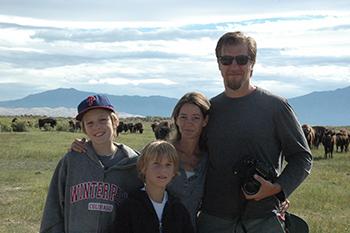Origin Story: Globe of Frogs
by Tony Moore

Picture of Mike Daecher and his family.
Unless you attended Dickinson from winter 1989 to spring 1990—a small window of time, to be sure, and even then you might have missed it—you probably haven't heard of the campus publication Globe of Frogs (GoF). But if you've read the article "Alternative Ink" in the fall 2012 issue of Dickinson Magazine, in which GoF is featured, you know that the paper initially came out anonymously via dot-matrix printer with the motto "All the News Is Fit to Print" and released some free-flowing venom on the reader. The publishers of GoF, revealing themselves in issue 3 to be Michael Daecher '91 and Patrick Charles Lamb '90, recently weighed in on the history of the publication, bringing to light the process behind creating the angry little newspaper.
Daecher: I always knew GoF would catch up with me! There were very few alternative voices heard around campus, so Pat and I started the paper to poke people in the eye. GoF was an attempt to shake things up and get people talking. This was pre-Internet, don't forget. It was amateur and crude but heartfelt.Lamb: GoF was named after the Robyn Hitchcock album, but, like a lot of decisions we all made late at night under our self-imposed deadlines, I cannot really give a great reason. The paper was a reaction by a bunch of non-Greek outcasts who wanted a more public voice. That is not really a quote I want to use without Mike's OK.
Daecher: Yep, that pretty much nails it.
Lamb: We used to print GoF on a Xerox machine downtown. When we "came out" we started to use the college copy center. The ladies at the center balked at copying GoF, given some of the interesting language we used. Ultimately, the administration told them that they had to print it.
Daecher: I'm pretty sure we both had to learn PageMaker to "design" issues on original Macintosh computers in the Writing Center.
Lamb: Mike and I were part of a group of writers and tutors at the Writing Center and DJs at WDCV, and we all got together to try to express our frustration. Not that we weren't having fun; we were just tired of being on the periphery.
So we took our own money and started GoF. We also received some private support from faculty members, including the author in residence, Robert Olmstead, who I think sent us $50. He suggested that we spend it on GoF or "more beer."
Daecher: I totally forgot about the $50 from Olmstead—pretty sure we had enough left over to get case of Yuengling 16 oz. returnable bottles.
Lamb: Despite our apparent bitterness in GoF, this was actually a great time for us—we learned a lot, and hopefully someone enjoyed what we wrote.
Daecher: I'm glad to hear some hard copies have survived. I actually remember carrying an issue to the library for the archives [a picture of which appears in "Alternative Ink"].
With Globe of Frogs tucked safely away in Archives & Special Collections, Daecher now lives in Boulder, Colo., with his wife of 18 years, Anouk, and two sons, Ben, 11, and Finn, 9. He spends his time working for an online education start-up, playing baseball with his boys, exploring trails on his mountain bike and working on (and sometimes riding) his vintage BMW motorcycle. His fondest memories of Dickinson include debating America's status as the "city on the hill" with Professor of Political Science Doug Stuart, student teaching at Carlisle Area High School and studying abroad his junior year (in Durham, England), when he met his future wife and got a taste for travel that endures to this day.
Lamb now spends most of his time enjoying the exploits and successes of his four children, Dylan, Morgan, Sophia and Patrick. In his spare time he coaches intramural soccer, solves his clients' problems and tries to keep a steady workout routine between concerts, Facebook, the beach and his girlfriend, Jeanne. He misses Tuesday nights at local watering hole the Blessed Oliver Plunkett, coffee and donuts, the "back-burner crew" (as he and his social circle dubbed themselves), Professor of Political Science Eugene Hickok as an advisor and taking studio-art classes.
Published October 1, 2012